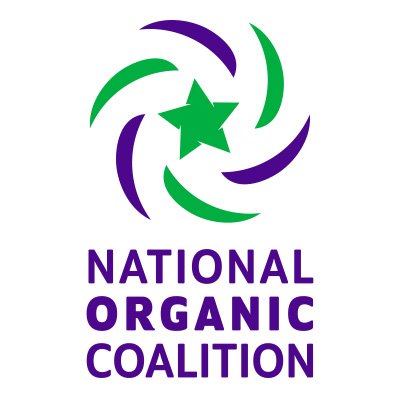
An Existential Question for Organic -- What Kind of System Do We Want?
(Above, from l. to r., David Posner of Awe Sum Organics, Ariane Lotti of Tenuta San Carlo, Doug Crabtree of Vilicus Farms)
“We all left the old system (conventional agriculture) because we wanted something different. Now, we are becoming just like the old system.”
This was the comment that made the biggest impression at the Protecting Farmer Prices discussion, a panel that I moderated last week at the Organic Trade Association’s Bold Ideas and Critical Conversations Conference in Washington, D.C.
As organic has evolved from niche to mainstream, the rush of companies entering the sector has been non-stop. We are now faced with a “race to the bottom” environment, where the largest retailers are in a constant quest to lower prices in order to grow and maintain market share.
Further exacerbating the problem is that the USDA has failed to enforce the rules, allowing things such as hydroponics and ‘factory dairy farms’ to operate in organic. This has created an unfair competitive environment, which has pushed prices to artificially low levels and made life brutally challenging, if not impossible, for many small and mid-sized, soil-based organic farmers.
With no clear and easy answer to this problem, panelist Doug Crabtree, an organic farmer and owner of Vilicus Farms in Montana, correctly said, “We have to be more creative.”
Other industry stakeholders agree, and out-of-the-box solutions must be considered.
“There needs to be a paradigm shift,” echoes Errol Schweizer, organic entrepreneur and former Executive Global Grocery Coordinator at Whole Foods Market, who was not at the conference.
“We have to stop relying solely on the marketplace. Why, when there is all of this demand for organic, are farms going out of business? We have experienced a catastrophic displacement of farmers over the last few decades, with huge hurdles for new farmers. We need to start thinking about or working on ways to better control the price and supply of crops, and actively transition farmers into growing crops that meet the current needs of consumers. This could lead to supply management or a hybrid model based on the Norwegian cooperative system.”
This, he suggested, could be managed by the public, similar to a public utility, and not by industry, with legal protections in place for farmers that would transition them to regenerative farming systems and keep them on the land. It would have to start with a grassroots effort led by consumers in order to become policy.
“At a time when the current administration has spent $28 billion in the past 24 months to subsidize farmers who are mostly producing GMO crops for export, organic needs to think boldly about protecting its current and future farmers for practices that matter — practices that enhance soil health and do not poison the environment with cancer-causing chemicals,” said Errol Schweizer.
He also said that companies can start addressing this problem by looking at their own supply chain, coming together with other brands to pressure retailers to maintain margins for farmers, and helping to fund consumer groups for who will advocate for policy change.
One organization that is addressing procurement in a novel way is The Good Food Purchasing Program, which is designed to do for the food system what LEED certification did for energy efficiency in buildings.
It now operates in 15 cities throughout the U.S. with 28 institutions participating, including school districts, recreation and parks departments, airports, and convention centers.
The program provides a metric-based, flexible framework that encourages large institutions to direct their buying power toward five core values: local economies, environmental sustainability, valued workforce, animal welfare and nutrition.
“The whole idea was to create more market demand for well-produced food. We have made progress in helping organic farmers and want to figure out ways to get organic farmers more of this market share. Cost is certainly an issue, which is why we are looking for funding for school districts so they can purchase more organic,” said Paula Daniels, Co-Founder of The Center for Good Food Purchasing.
Other possibilities to help alleviate the margin pressure on organic farmers are the soon-to-be-introduced, add-on labels — Regenerative Organic Certification and The Real Organic Project. Neither program has released certified products just yet, so it is hard to ascertain how big and how quick of an impact each will have on the marketplace.
Protecting prices for farmers is a complex yet critical issue.
The only thing that we can be certain of is that if the industry does not tackle this in a bold way — and very soon — we will end up becoming the system we wanted to avoid.
(Photo above courtesy of the Organic Trade Association/Erika Nizbroski)
***

While in Washington, D.C. last week, I met up with my fraternity brother from college, Representative Dean Phillips (D-MN) — someone that I hadn’t seen in 28 years.
Rep. Phillips is the most accomplished organic food entrepreneur we have in Congress. He founded Prairie Organic Spirits, the country’s leading organic vodka brand, and invested in and helped managed Talenti, a gelato brand with certified organic SKUs that was eventually sold to Unilever.
Among other issues, I spoke with him about the USDA illegally allowing hydroponics in organic and glyphosate being sprayed on land of hydroponic organic farms. I look forward to continuing the dialogue with him about important matters facing our industry, as I know he cares deeply about organic.
 |
Have a great day! 
Max Goldberg, Founder |
Quick Hits
* SÜPRMARKT and its founder Olympia Auset want to add a much-needed organic market to their South LA neighborhood.
* A massive CBD emporium just opened in NYC.
* The TSA has clarified its stance on whether it is legal or not to fly with CBD oil.
* Kudos to Nya Marshall, a Detroit entrepreneur who is turning a blighted building into a future organic restaurant and bar. (video)
* Hemp Industries Association has launched a “Hemp Is Legal” campaign in Times Square.
* Organic juice and smoothie vending machines debut in California.
* How Food Roots provides locally-grown organic Asian produce to people with financial need.
* Men’s clothing brand Bonobos has come out a with a stretch organic cotton chino.
* Millennials ‘Make Farming Sexy’ in Africa, where tilling the soil once meant shame.
* CCOF, Cathy Calfo and the roots of the Santa Cruz organic movement.
New Organic Products
Watermelon Seed Butter by 88 Acres
Is watermelon seed butter the hot new trend? 88 Acres sure hopes so. Made with watermelon seeds, sunflower oil and sea salt, this organic watermelon seed butter is gluten-free and contains no added sugar.
Walnut Taco Salad by Juice Press
NYC-based Juice Press has come out with its best salad yet – a certified organic walnut taco salad. Completely plant-based, it is made with walnut-mushroom “meat”, lettuce, cabbage, guacamole, and yellow peppers flavored with jalapeños, lime juice and chipotle.
All-in-One Shake by Vega One
The company’s first certified organic protein powder, Vega One Organic All-in-One Shake contains 20g of protein and greens from Earthbound Farms. This plant-based protein powder comes in 6 flavors – French vanilla, chocolate, plain unsweetened, mocha, coconut almond and berry.
Want your product profiled here? Learn more
Weekly News Summaries


Big Wins for Organic in House Spending Bill
In the fiscal year 2020 agriculture funding bill, the National Organic Coalition helped secure wins for organic dairy and to fight import fraud.

Amazon Helps Lift Traffic at Whole Foods
By Russell Redman
Traffic metrics show an increase in Whole Foods, largely due to visits from Amazon Prime members.
Bumble Bees poised to be Protected Under the California Endangered Species Act
An upcoming vote of the California Fish and Game Commission could set in motion the listing of four species of native bumble bees as endangered, sealing their fate for survival.


Vegan Meal Kit Purple Carrot Acquired by Leader in the Japanese Organic Market
By Anna Starostinetskaya
Oisix, Japan’s largest meal kit and organic food delivery service, has purchased Purple Carrot for $30M, and the partnership will bring the first plant-based meal kits to Japan.
Opponents of Pesticide Ban Receive Big Contributions from DowDuPont
By Frank Bass
DowDuPont, the primary chemical manufacturer of chlorpyrifos, has been found to disproportionately contribute to congressional campaigns against the pesticide ban.
Perdue Premium Meat to Acquire Panorama Meats
Panorama Meats, the nation’s largest producer of 100% grass-fed and grass-finished certified organic beef, has been purchased by Perdue Premium Meat Company.

As Marijuana Becomes Commoditized, Prices for "Organic" Cannabis Face Pushback
By Trevor Hughes
Even though there is no such thing as "organic" marijuana just yet, sustainable and chemical-free cannabis is facing pricing pushback from customers.

Most Grass-Fed Beef Labeled ‘Product of U.S.A.’ is Imported
By Deena Shanker
Perdue Farms is hoping to end the disconnect in the American beef industry, a result of misleading 'grass-fed' and 'product of USA' labels.

Survey: Consumers are Confused about the Definition of Plant-Based
By Jessi Devenyns
According to the International Food Information Council's annual Food and Health Survey, there is still real confusion about what plant-based means.

Boulder-Based Cusa Tea Raises $2.5M
By Libby Flood
Cusa Tea, which claims to be “the world’s first organic instant tea company,” closed on a $2.5M investment round.
The material in this newsletter is copyrighted and may be reprinted by permission only. All requests must be in writing. Please use our contact form to request republication rights.
Newsletter Archive
Quick Hits
* SÜPRMARKT and its founder Olympia Auset want to add a much-needed organic market to their South LA neighborhood.
* A massive CBD emporium just opened in NYC.
* The TSA has clarified its stance on whether it is legal or not to fly with CBD oil.
* Kudos to Nya Marshall, a Detroit entrepreneur who is turning a blighted building into a future organic restaurant and bar. (video)
* Hemp Industries Association has launched a “Hemp Is Legal” campaign in Times Square.
* Organic juice and smoothie vending machines debut in California.
* How Food Roots provides locally-grown organic Asian produce to people with financial need.
* Men’s clothing brand Bonobos has come out a with a stretch organic cotton chino.
* Millennials ‘Make Farming Sexy’ in Africa, where tilling the soil once meant shame.
* CCOF, Cathy Calfo and the roots of the Santa Cruz organic movement.



